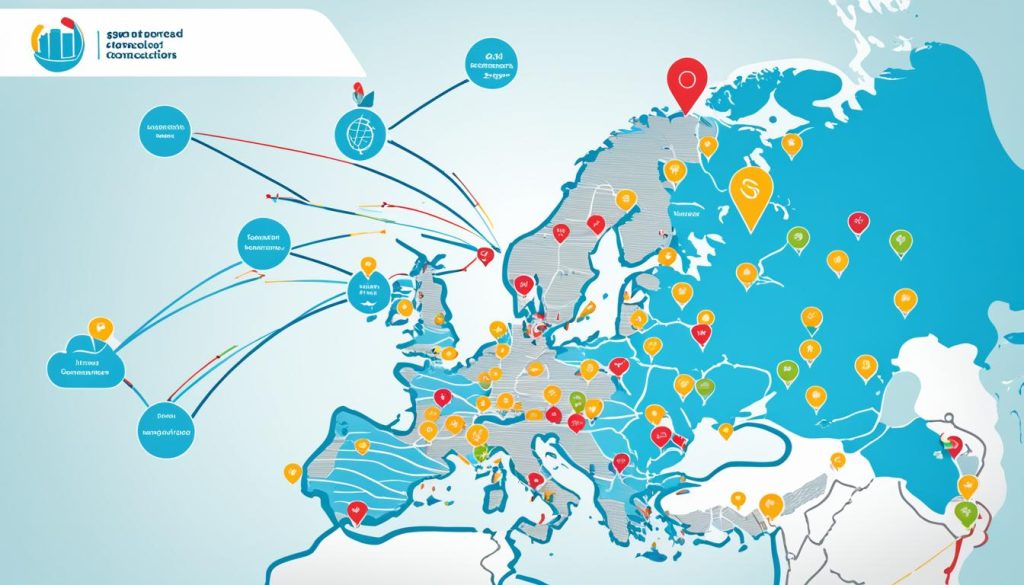Starting a business in the Netherlands comes with big benefits. This includes a top spot in Europe and a strong economy. You need a Dutch business bank account before registering with the Netherlands Chamber of Commerce KVK. This account is key for handling your company’s finances well, making transactions easy and following local rules.
For entrepreneurs outside the SEPA zone, opening a Dutch business bank account can be tough. Tough laws and strict policies are in place for a reason. They make sure everything complies with Dutch regulations. That’s where the Netherlands Foreign Investment Agency (NFIA) steps in. They offer a Quick Scan service called ‘Dutch Business Bank Account’ to help startups. With it, running your business smoothly and accessing various financial services becomes possible.
Key Takeaways
- A Dutch business bank account is necessary before Netherlands Chamber of Commerce KVK registration.
- Such an account ensures proper Netherlands company finance management.
- Non-SEPA zone entrepreneurs require a Dutch business bank account for smooth operations.
- The NFIA provides a Quick Scan service to facilitate account opening.
- Compliance with Dutch laws and acceptance policies is strictly monitored.
Why You Need a Business Bank Account in the Netherlands
Having a business bank account in the Netherlands is crucial. It helps your enterprise run smoothly and follow Dutch rules. It keeps your business in good standing with the regulations.
Compliance with Dutch Laws
Following Dutch laws is key for businesses. You must get a Chamber of Commerce number when you start. A specific business bank account makes meeting these Dutch rules simpler. It helps with managing money and making audits easy.
Separation of Personal and Business Finances
Having a separate account eases many financial issues. It stops the mix-up of personal and business money. This separation is good for managing finances. It also makes record-keeping clear and straightforward.
Access to Financial Services
A business account opens up essential financial services. These include credit cards and loans, which are needed for growing your business. These services help in meeting Dutch business standards. They provide banking solutions that fit the regulations.
Choosing the Right Bank for Your Needs
Choosing the right bank for your business in the Netherlands is crucial. You must look at both traditional and online banks. This helps in making a well-informed choice.
Traditional Banks
Banks like ING, ABN AMRO, and Rabobank are big names in the Dutch market. They know the local market well and offer many services, including personal help. They are stable and trusted but may charge more and offer less flexibility.
Online Banks
Online banking is becoming very popular in the Netherlands for its ease and speed. Banks such as N26 and Revolut offer 24/7 access, lower fees, and quick account opening. They work well with accounting software, which helps businesses. But, they might not offer the personal service that traditional banks do.
Key Features to Consider
When picking between traditional and online banks, think about these key features:
- Fees: Look at the fees for account maintenance, transactions, and any extra costs.
- Interest Rates: Find banks with good interest rates for savings and loans.
- Business Loans: Check if the bank has business loans that suit your needs.
- Integration with Accounting Software: Banks that sync with your accounting software can make managing finances easier.
Evaluating these factors carefully will help businesses find the best bank for their needs in the Netherlands.
Required Documents for Opening a Dutch Business Bank Account
Opening a Dutch business bank account requires a set of documents. Having these papers ready in advance can make things easier. It helps you avoid delays during the application process.
Proof of Identity
You need to prove who you are to open the account. A valid passport, national ID card, or government-issued document works. Banks must make sure it’s really you.
Proof of Address
You also need to show where you live. A recent bill, lease, or official letter with your address is needed. This confirms your living place and completes the identity check.
Business Registration Documents
For business registration in the Netherlands, you’ll need specific documents. This includes your Chamber of Commerce registration, VAT number, and articles of association. Make sure these are up-to-date and show your business details correctly to open your account without trouble.
Understanding the SEPA Zone and Its Benefits

The Single Euro Payments Area (SEPA) is a team effort by European countries to make euro payments easier. It helps with easy, safe cross-border transactions. This boosts financial activities.
What is SEPA?
SEPA stands for Single Euro Payments Area. It’s a place where people and companies can send euro payments and direct debits the same way everywhere. It makes paying across Europe as easy as within your own country. Thanks to IBAN, you don’t need different bank accounts in different countries. This makes cross-border payments simpler.
How SEPA Simplifies Payments
SEPA lets companies easily manage money across different countries. With SEPA, using IBAN for transactions across borders is straightforward. This makes things cheaper and simpler, cutting out the old banking hassles. For businesses in many European countries, it means smoother payment methods.
Steps to Open a Business Bank Account in the Netherlands
Opening a business account in the Netherlands has important steps. Each one is key for following Dutch banking rules and keeping your business money matters smooth. Let’s look closer at what these steps are.
Choosing the Bank
Choosing the right bank is your first move. Think about what you need in terms of fees, services, and support. Big banks like ING Bank, ABN AMRO, and Rabobank have many options for businesses.
Submitting Your Application
After picking your bank, you’ll apply. This means filling out forms and giving them things like your ID, address proof, and business registration. Be careful to fill out these forms right to avoid delays.
Completing KYC Checks
With your application in, you’ll go through KYC checks. The bank checks who you are and if your business is legit. You might need to give more details or meet with bank people, especially if your business is linked to other countries.
Business Bank Account in the Netherlands vs. Other Countries

When you’re setting up your business finances, it’s crucial to look at what Dutch business bank accounts offer. They might be more beneficial than banking options in other countries. Let’s dive into the benefits and compare them to UK business accounts.
Benefits of a Dutch Business Account
A key perk of having a Dutch business bank account is getting into the SEPA payment system. This makes European transactions smoother and cheaper. Also, the financial environment in the Netherlands supports business growth with good incentives and a stable economy. Companies enjoy competitive services and strong support networks here.
Comparison with UK Business Guardianship Duties Outside of Court Proceedings
Looking at Dutch versus UK business banking, there are some clear differences. UK accounts may come with varying fees and interest rates that affect your costs. But, Dutch banks might offer lower fees for payments within Europe and simpler rules. These points are crucial for making a good decision based on your business needs.
By understanding these banking differences internationally, you can choose the best resources for your business with confidence.
Using the Quick Scan ‘Dutch Business Bank Account’
The Quick Scan ‘Dutch Business Bank Account’ helps new businesses in the Netherlands. It makes opening a business bank account easier. It is a great tool for start-ups and entrepreneurs, showing them how to apply without trouble.
How to Access the Quick Scan
Getting started with the Quick Scan is easy. First, go to the Dutch Banking Association’s official website. Look for the section on business bank accounts and download the form. Fill it in and don’t forget to include all the needed documents. Then, send it off. The bank will check your form and get back to you in five working days.
Documents Required for Quick Scan
To apply for a business bank account, you need some important documents:
- A valid proof of identity, such as a passport or national ID card.
- Proof of address, like a recent utility bill or rental agreement.
- Business registration papers from the Dutch authorities.
- Any other documents the bank might ask for.
- No minimum balance requirements
- Convenient, app-based account management
- Instant notifications and updates
- In-depth local expertise
- Personal relationships and tailored financial advice
- Comprehensive financial services
- Contact the bank to get to know their specific needs and how they handle remote setups.
- Make sure you have all required documents ready and properly verified.
- Be ready for any possible extra steps that might need you to be there in person.
- Consider getting help from experts or consultants, as they might be able to act on your behalf in the Netherlands.
By carefully preparing these documents, you boost your chance of getting a bank account quickly. This makes starting a business in the Netherlands easier for new entrepreneurs.
Top Banks to Open a Business Account With in the Netherlands

If you’re setting up a business in the Netherlands, look at ABN AMRO, ING Bank, and Rabobank. They shine as the best options. Each one has services for different business needs. This includes both local and global entrepreneurs.
ABN AMRO
ABN AMRO is perfect for both new and growing businesses. They focus on what their customers need. They offer advice and banking that grows with you.
ING Bank
ING Bank is great for businesses keen on digital tools. Their online banking is easy to use. They offer many services, making financial management simple and clear. ING and Rabobank are known for their excellent online services.
Rabobank
Rabobank stands out for its focus on community and sustainability. They offer support and financial products for every kind of business. Rabobank is a trusted partner, whether you’re local or worldwide.
Online vs Traditional Banks: Which is Best for Your Business?
Choosing between online banks like Bunq and traditional Dutch banks for your business needs is crucial. Each type offers unique benefits, from local insights to simple, digital tools. Think about what your business needs most to pick the right bank.
Advantages of Online Banks
Online banks stand out for modern companies with several benefits. Their app-based controls mean you can manage money anywhere. Bunq, for example, is great for startups with its easy-to-use interface and no need for a minimum account balance.
Advantages of Traditional Banks
Traditional Dutch banks, however, shine for businesses needing a more human touch and local wisdom. Banks like ABN AMRO, ING Bank, and Rabobank bring valuable local market insights. They offer personalised service and extensive financial advice.
Through a business account comparison, it’s clear that traditional banks are unmatched in services. They suit businesses deeply integrated with local markets or those that value strong support networks.
Timeline for Opening a Business Bank Account

Getting a business bank account in the Netherlands requires understanding the steps involved. You need to consider the application, KYC checks, and approval. Here’s a quick guide:
Initial Application
The first step is applying. You can do this online or in person at banks like ING or ABN AMRO. ING often processes applications for Dutch entities quickly, providing an account number within a day. But if your business has foreign shareholders, you’ll need more paperwork. This can make the process longer.
KYC and Compliance Checks
After applying, banks do KYC and compliance checks. These checks are vital for meeting Dutch laws. If your company has foreign shareholders or a complex structure, approval might take longer. These steps can add up to two more weeks as banks check all information carefully.
Final Approval
Once KYC checks are done, you get the final nod. The time to open the account varies. But typically, after KYC approval, your account is ready in a few days. This marks the end of the process. Now, you can enjoy your business bank account’s benefits.
Do I Need to Visit the Netherlands to Open a Business Bank Account?
In the past, to open a business bank account in the Netherlands, a trip there was needed. Now, you can set up a business bank account remotely, thanks to new tech. This is great news for businesses looking to grow in the Dutch market.
But, it’s important to know that some banks may still require you in person for certain checks. Even though many banks use digital checks now, a few demand meeting face-to-face due to local laws.
For a successful remote bank account setup, you should:
Following these tips can help make setting up your bank account from afar easier. It lets you focus more on expanding your business in the Netherlands.
The Compliance and Regulatory Environment
The Netherlands has strict, yet fair rules for its financial sector. If you want to start a business there, knowing these rules is crucial. Companies must give a lot of documents to meet the country’s high standards.
Overview of Dutch Banking Regulations
Dutch banking is controlled by detailed rules. These rules aim to make the sector transparent and safe. They require businesses to keep thorough documents and follow Know Your Customer (KYC) practices. The goal is to manage financial risks and keep banking steady.
Key Compliance Requirements
Following Dutch banking rules involves several important steps. Key requirements include providing detailed company info, identity proof, and registration papers.
Businesses might also need to show they have a real economic presence in the Netherlands. This can mean having a local director to oversee the company. These regulations help maintain a strong, safe, and clear banking













